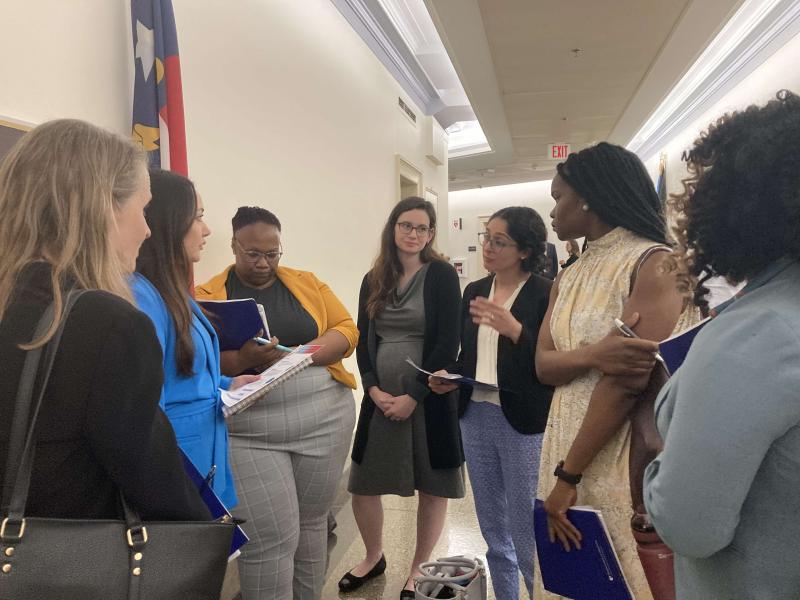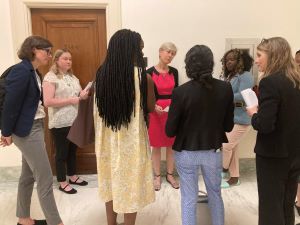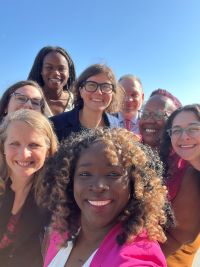
On an April morning in 2024, a group of dedicated Duke Medicine fellows stood on Capitol Hill, ready to present their carefully crafted advocacy message to North Carolina’s Representatives and Senators. United by a common goal, these fellows from oncology, palliative care, cardiology and gastroenterology aimed to advocate for the permanent extension of telehealth access through legislation. Their passion and preparation paid off when two legislators signed on as co-sponsors to their proposed bill, moving the needle in real-time and marking a significant achievement for the inaugural Fellows Advocacy Curriculum cohort.
This success story is a testament to the unique opportunity the Fellows Advocacy Curriculum (FAC) provides. An elective track designed for subspecialty Medicine fellows who are passionate about health policy and advocacy, FAC allows fellows to engage directly with the legislative process and develop their own advocacy platforms. This is not just a program but a platform for fellows to citizen-lobby legislators in Washington, D.C., making a real impact in shaping health policy.
The inspiration for FAC came from the Advocacy and Clinical Leadership Track (ACLT) for residents, co-directed by Dr. Caroline Sloan and Dr. Daniella Zipkin. Recognizing the need for a similar program for fellows, Dr. Sloan leveraged her experience with ACLT and the Society of General Internal Medicine’s health policy committee to create FAC, aiming to provide a robust framework for advocacy without altering the length or core content of fellowship training.

FAC’s comprehensive curriculum is designed to provide fellows with a broad overview of the health policy landscape in the United States. Each session follows a specific theme, covering topics such as the structure of government, health care payment models, the impact of government policies on the physician workforce, and the patients they treat. The sessions are interactive and in-person, featuring guest speakers from Duke University and nationwide. The curriculum is purposely flexible to accommodate changes in topics and speakers based on the fellows' specific interests, ensuring a tailored and relevant educational experience.
FAC is unique in its offering of hands-on advocacy experience. In the latter half of the program, fellows identify and develop an advocacy platform on an issue pertinent to their specialty or of cross-specialty importance. Last year, fellows united to advocate for the permanent extension of telehealth access, a critical issue highlighted by the COVID-19 pandemic.
“The fellows chose to advocate for telehealth reimbursement parity because it significantly impacts patient care across specialties,” explained Dr. Sloan. “Telehealth has proven invaluable, especially for patients in remote areas, and maintaining this access is crucial.”
The program's capstone is the two-day trip to Washington, D.C., where fellows present their advocacy platforms to legislators and legislative aides. This past April, the inaugural cohort met with staff from nine different offices, including an in-person meeting with Representative Deborah Ross (NC-02), resulting in two co-sponsors for their advocated bill. This real-world experience enhances fellows' confidence and demonstrates the tangible impact physicians can have on health policy.

The inaugural year of FAC has set a high standard, with fellows expressing interest in future roles in government and policy. FAC equips fellows with advocacy skills and opens doors to potential career paths in policymaking. Networking opportunities, such as meetings with the chief medical officers of CMS and FDA, provided this year’s fellows with insights into high-level government roles.
“I want this curriculum to help fellows learn how to be effective advocates and explore roles in policymaking,” shared Dr. Sloan. “The support from program directors and the fellows' enthusiasm has been remarkable, and we look forward to continuing this transformative program.”
Applications for the next cycle of FAC are now open, with a July 8 deadline. Interested fellows are encouraged to apply and take advantage of this unique opportunity to make a lasting impact on health care policy. For more information on the application process and session dates, please visit https://duke.is/v/pcxe or contact Dr. Sloan directly at caroline.sloan@duke.edu.